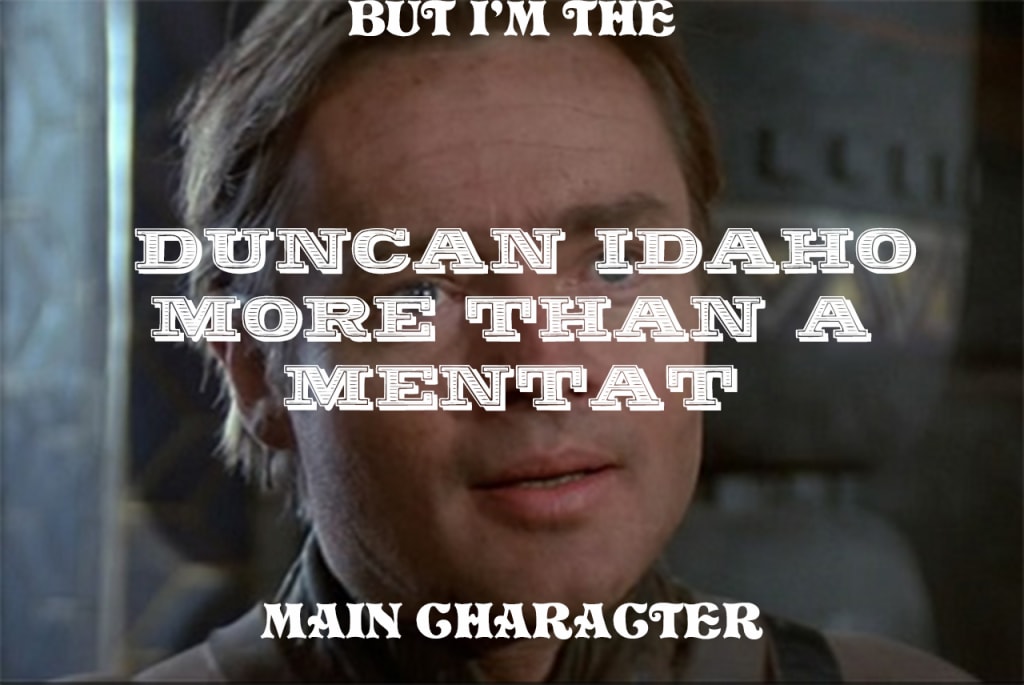Let's Talk About Dun(e)can Idaho
A Brief (but Spoiler-ific) Look at One of 'Dune's' Most Important Characters

The Duniverse (that is, the Dune Universe), whose life began with the publication of Frank Herbert's original masterpiece in 1965, is a lush wonderland of possibilities, despite its arid world of inception. One character in particular single-handedly explores a majority of those possibilities on his own: Duncan Idaho. I have never had the great pleasure of looking at Mr. Herbert's original manuscripts, so I cannot tell you exactly when Herbert decided that Duncan Idaho, not “the Atreides,” was the main character of his Dune books. But rest assured that he is, and any further reading by anyone who has not finished the main Dune series (that is up through the end of Sandworms of Dune) will be riddled with spoilers.
I went into this in some minor detail in my previous piece about high hopes for Legendary Entertainment's potential Dune cinematic universe, equating Duncan Idaho to R2-D2, the storyteller who witnesses the events of his entire science fiction universe. Up until the final entry in the series, Sandworms, Duncan is certainly portrayed as this: he stands beside Paul Atreides up to his death at the hands of the Sardaukar in Dune. In Dune: Messiah he is revived as the ghola, Hayt, and witnesses the transition of power from Paul to his sister Alia. In Children of Dune, he is present to partake in the fall of the love of his life (one of many, many such loves to come) and the rise of Leto II. In God Emperor of Dune, through nigh uncountable (because we never receive a count, though we might make guesses) serial ghola reincarnations, Duncan witnesses the 3,500 year reign of the God Emperor Leto II and eventually helps take down “the Tyrant.” In Heretics of Dune, it is revealed that Duncan has been revived numerous times again by the Bene Gesserit sisterhood, albeit with all of his previous incarnations' memories and with some genetic tampering that will bring him up to speed, and from that point on we follow the one perfect Duncan Idaho through the end of the series.
One will look at this and perhaps reply, “Well yes, he certainly experienced a lot, but you said he experienced 90 percent of what the Duniverse had to offer.” This is true, and I may have phrased that a bit poorly. But it is very close to accurate. In Dune, there are three major factions of powerful thinkers; these are the Bene Gesserit Reverend Mothers, the Mentats, and the Spacing Guild Navigators. Beyond this, religion carries a very heavy hand in Dune, with major beliefs being centered around the Zensunni structure (upon which the Tleilaxu Zensufi beliefs have origins) and the Orange Catholic structure, which most characters appear to be educated on in one way or another. One final group of great thinkers exists in the imperium of Dune—that is the technological powerhouse that is Ix. Why do I note all of this? Because amongst his serial incarnations, Duncan Idaho was a Mentat, a Zensunni philosopher, and trained in the Bene Gesserit ways, alongside learning combat strategies from two of the greatest generals in the Duniverse (excusing, of course, Duncan himself): Thufir Hawat, the original mentat of the Atreides, and Miles Teg, the many-times-over general of Bene Gesserit forces. These numerous compounded life times and near-infinite pools of training ultimately culminate in one great reveal at the end of the Dune saga: Duncan Idaho is the “Ultimate Kwisatz Haderach.”
Frequently throughout the series, major players note the power of the Atreides for prescience. Not a single member ever once notes that this trend toward prescience begins with Paul Atreides, and that power is introduced as a trait brought on by training as both Mentat and Bene Gesserit. It should come as no great surprise then that Duncan Idaho, with thousands of years of life experience, observations, and training in so many different forms of thought, should obtain his own sort of prescience. The idea that Duncan is “more than a mentat” is perhaps first brought to attention when it is revealed that, at least to a small extent, he can plot a course through fold-space much in the same way as Guild Navigators, albeit with decided fear at the potential of killing everyone onboard his ship, and who wouldn't be a little afraid of that?
This is what we as fans of Dune must hope comes across in the forthcoming Villeneuve movies. Well, this, and a decided lack of sonic cannons, demonic growling voices, and the complete loss of emphasis on martial prowess. Why exactly did David Lynch think the seductive, awe-inspiring Bene Gesserit “Voice” should be replaced with whatever came up in his movie?
About the Creator
Caleb Sherman
Twitch.tv streamer (Amnesia Duck), retro game enthusiast (don't ask me about Ataris though), lucky husband, and author.






Comments
There are no comments for this story
Be the first to respond and start the conversation.